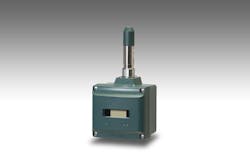Yokogawa Develops Multi-protocol Wireless Adaptor that Enables Wired Field Instruments to Function as ISA100 Wireless Devices -HART and Modbus Models to be Released-
Yokogawa Electric Corporation announces that it has developed a multi-protocol wireless adaptor that enables wired field instruments or analytical sensors to be used as ISA100 Wireless devices, and will release models in May and July that support communications based on the HART and RS485 Modbus standards. To facilitate the introduction of field wireless systems in plants, Yokogawa plans to release additional models that will cover other standards.
Development Background
Field wireless systems enable the field devices and the host-level monitoring, control, and other systems in a plant to communicate wirelessly with each other. They have numerous advantages such as allowing the placement of field instruments or analytical sensors in difficult to wire locations, eliminating the need for cables to connect devices, and costing less to install. In accordance with its Wireless Anywhere concept, Yokogawa is seeking to promote the plant-wide use of field wireless systems by developing ISA100 Wireless devices such as this multi-protocol wireless adaptor.
Product Features
When the multi-protocol wireless adaptor is mounted on a wired field instrument or analytical sensor, the instrument or sensor is able to function as an ISA100 Wireless device. It may be used with any type of wired field instrument or analytical sensor commonly used in plants, including those used to monitor temperature, pressure, liquid level, or vibration, or to detect gas and is compatible with both Yokogawa devices and devices from other vendors. By giving customers a greater range of field instruments and analytical sensors to choose from, Yokogawa expects that this multi-protocol wireless adaptor will greatly facilitate the introduction of field wireless systems.
1. Support of multiple standards
The first two models are intended for wired HART and RS485 Modbus communications, both of which are widely used in plants. Yokogawa plans to release models that are compliant with other wired field communications standards such as FOUNDATION fieldbus and PROFIBUS.
2. Battery power source for field instruments and analytical sensors
The battery in the multi-protocol wireless adaptor can also power the field instrument or analytical sensor, eliminating the need for wiring. As with other Yokogawa field wireless devices, the multi-protocol wireless adaptor uses a large-capacity lithium-ion battery, and this is able to power both the multi-protocol wireless adaptor and the field instrument or analytical sensor for a long time. An indicator on the host system shows the estimated remaining days of battery life.
3. Environmental resistance
An all-weather model type that is waterproof and dustproof performance and an explosion-protection type that can be used in the presence of inflammable gases are scheduled to be released.
Major Target Markets
Industries such as oil & gas, LNG, refining, petrochemicals, chemicals, power, pulp and paper, pharmaceuticals, foods, and iron and steel
Applications
In plants, enabling wired field instruments and analytical sensors to function as ISA100 Wireless devices
Yokogawa will demonstrate this multi-protocol wireless adaptor at the ARC Industry Forum to be held February 10 – 13, 2014 in Orlando, FL.
Yokogawa’s Approach to Field Wireless Communications
Yokogawa released the world’s first ISA100 Wireless system devices and wireless pressure and temperature transmitters in July 2010. In addition to enabling sophisticated control techniques in continuous processes, this gave customers a wider range of devices to choose from. In July 2012, Yokogawa released a reliable, large-scale field wireless system for use in plants and is now expanding the range of suitable monitoring and control applications for wireless technologies and devices.
In addition to being highly reliable, suited for a wide range of applications, and expandable, ISA100.11a is compatible with wired communications standards such as FOUNDATION fieldbus, HART, and PROFIBUS. The International Electrotechnical Commission (IEC) is currently considering the adoption of the IEC62734 standard, which is based on ISA100.11a.
In line with the Wireless Anywhere concept, Yokogawa will continue to expand its lineup of ISA100 Wireless solutions and promote the use of field wireless technologies.
* A technology that is based on the ISA100.11a standard. It includes ISA100.11a-2011 communications, an application layer with process control industry standard objects, device descriptions and capabilities, a gateway interface, infrared provisioning, and a backbone router.
The names of companies, products, and brands in this text are registered trademarks or trademarks of the respective holders. For more information, please click here.

